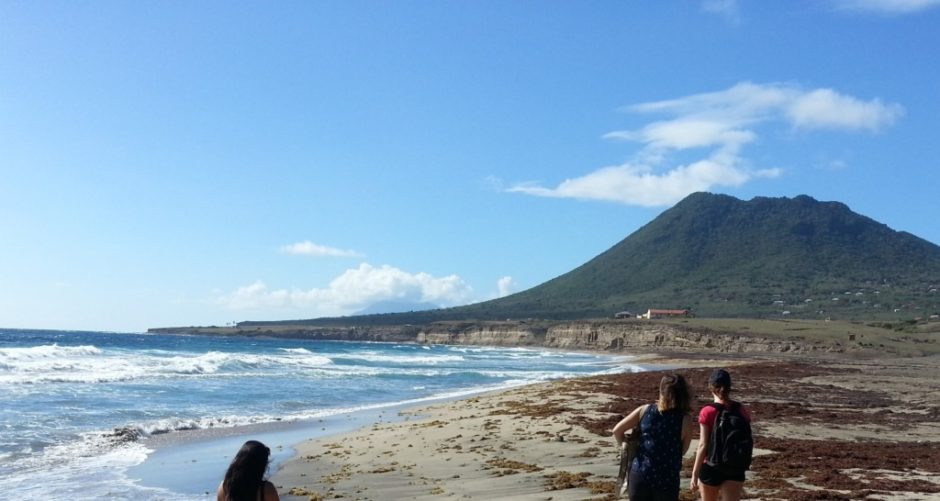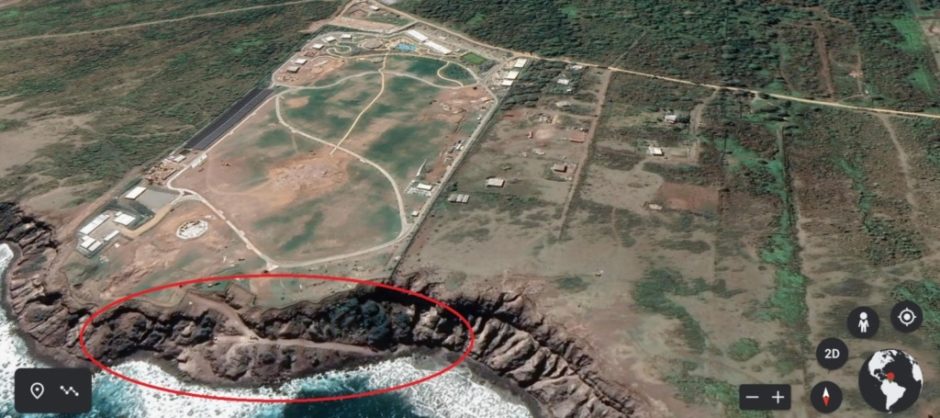Niet rommelen aan Atlantische klif Sint Eustatius
door Clarisse Buma
(for English, see below)
Langs de woeste Atlantische kant van Sint Eustatius heeft een rijke investeerder uit Europees Nederland een luxe hotel gebouwd. Een impuls voor het toerisme is toe te juichen, want op Statia kun je heerlijk wandelen en duiken. Bovendien schept het hotel nieuwe banen.

Echter, de gekozen locatie van het hotel is op zijn zachtst gezegd curieus te noemen. Door de ligging is er geen toegang tot de zee. Metershoge kliffen scheiden het land van het water. In zee zwemmen is bovendien gevaarlijk vanwege de sterke stroming. Niet voor niets is zwemmen bij Zeelandiabeach, ook aan de Atlantische kant, verboden.
Ik schrok dan ook enorm toen ik op Google Earth zag dat tijdens de bouw (begonnen rond 2019) een illegaal pad naar zee is uitgegraven. Inmiddels zijn delen van het pad ingestort. Ik kan me niet voorstellen dat de lokale overheid hiervoor toestemming heeft gegeven! De klifs bestaan uit zand, stenen en vulkanische resten. Ze zijn zacht en kwetsbaar. Een hotel aan de Caribische kant staat al op sluiten vanwege instortingsgevaar van de klif. Achter de landingsbaan zijn delen van de klif weggeslagen. En nu dit!

Het pad veroorzaakt risico’s voor het Sint Eustatius National Marine Park, dat onderaan de klif begint. Dit Nationaal Park onder water is internationaal beschermd en van unieke schoonheid. Het biedt onderdak aan koralen, zeeschildpadden, vissen en haaien. Door eroderende kliffen komt zand in zee terecht, terwijl koralen juist helder water nodig hebben.
Overigens, het gerommel aan de klif is ook een risico voor het hotel zelf. Er ligt dicht bij de klif een heel diep zwembad. Wat doet dit met de stabiliteit? De klif is je natuurlijke kustverdediging tegen de gevolgen van klimaatverandering. En, hoe is de drinkwatervoorziening van het hotel eigenlijk geregeld?
Den Haag zette in 2017 het lokale bestuur aan de kant vanwege taakverwaarlozing en wetteloosheid. Maar het lijkt erop dat er sindsdien niet genoeg is gedaan om de negatieve effecten van dit hotel op de natuur ten goede te keren? Ga handhaven! Of is hier het aloude gezegde van kracht: wie betaalt bepaalt?
New hotel threatens cliff Sint Eustatius
A wealthy investor from the European Netherlands has built a luxury hotel along the wild Atlantic side of Sint Eustatius. An impulse for tourism is to be welcomed, because Statia is a wonderful destination for hiking and diving. In addition, the hotel creates new jobs.
However, the chosen location of the hotel is curious to say the least. There is no access to the sea. Meters high cliffs separate the land from the water. Swimming in the sea is also dangerous, because of the strong current. Because of that swimming at Zeelandiabeach, also on the Atlantic side, is prohibited.
I was therefore very shocked when I saw on Google Earth that an illegal path to the sea was dug out during construction of the hotel, which started around 2019. Parts of the path have since collapsed. I can’t imagine the local government allowed this! The cliffs consist of sand, stones and volcanic remains. They are soft and fragile. A hotel on the Caribbean side is already on the verge of closing due to cliff collapse. Behind the runway, parts of the cliff have been washed away. And now this!
The path creates risks for the Sint Eustatius National Marine Park, which starts at the bottom of the cliff. This underwater National Park is internationally protected and of unique beauty. It is home to corals, sea turtles, fish and sharks. Sand ends up in the sea due to eroding cliffs, while corals need clear water. Incidentally, the rumble at the cliff is also a risk for the hotel itself. There is a very deep pool close to the cliff. What does this do to the stability? The cliff is your natural coastal defense against the effects of climate change. And, how is the drinking water supply of the hotel actually arranged? The Hague put the local government aside in 2017 because of neglect of duty and lawlessness. But it seems that not enough has been done since then to reverse the negative effects of this hotel on nature? Enforce the legislation! Or does the old saying apply here: he who pay decides?
Clarisse Buma, former inhabitant of Sint Eustatius
